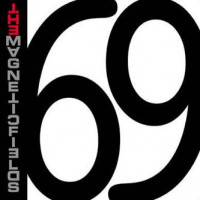Stephin Merritt, likely, possesses one of the most unique voices in music in the last 30 years. While he, along with the rest of Magnetic Fields, showed periodic bursts of genius across their first five studio albums. If was on their sixth studio album, 69 Love Songs, that came closest to being fully realized. Merritt originally conceived this album as a music revue; where four drag queens would perform the songs, with whomever was most well received getting paid at the end of the night. While I would love to see this album performed in that manner, the band clearly took this project in a very different direction.
While the most easily categorized genre for this release is going to the umbrella term of indie rock, even the novice ear can hear numerous influences and song types throughout this album. Aside from traditional rock songs structures, there are songs that wouldn’t have felt out of place on an 80’s synth-pop album, and others that wouldn’t have felt out of place on a pre-1980’s country album. The cross-genre application of the love song, adds to what was already a very ambitious album.
Another notable characteristic about this album, in 1999, was the fact the lyrics dealt not just with heterosexual relationships. But, also with homosexual and bisexual relationships. Which, given the Merritt is openly gay, shouldn’t be all that shocking. However, twenty years ago even the independent music scene wasn’t as readily accepting as they are today. The marginalization of members of the LGBTQA community in the music scene was far more accepted in the late 1990’s than it is today. So, even though all the songs on here are love songs, the subject matter in them was political due simply to its presentation even twenty years ago.
With all that in mind, this is an album with sixty-nine songs on it. All of them love songs. If there’s one lyrical area that’s been beaten to death since the dawn of songwriting. It’s going to be the love song, regardless of the emotions tied to that love. In that regard, Merritt succeeds more often than he fails. Even when the situation in the song is one we’ve all heard in a million other love songs, there’s a twist in the lyric that draws you in.
While the characters in these songs are nowhere as developed as they are in a song by Craig Finn or John Darnielle, they are instantly relatable. When Merritt croons in his big deep baritone, “I’m the luckiest guy, on the lower eastside ‘cuz I’ve got wheels and you wanna go for a ride.” We all know exactly what he means. It doesn’t matter if we live on the lower eastside, the Midwest, or somewhere in the Northwest. It doesn’t matter if we’re guys or not. Hell, it doesn’t even matter if we’ve got wheels or not. We all know what it feels like to find that one person who always wants to do that one thing with you. Maybe it’s you they like, maybe it’s the thing. But the two of you are doing it together, and for the time being. That’s good enough.
That isn’t to say there aren’t missteps here. When you make an album that’s almost three hours long with sixty-nine songs on it. Well, there’s going to be a few moments that don’t quite add up to the others. And I am still fairly convinced most of those come down to my musical tastes on a given day, not the fact any of these songs are particularly bad. I will say I do find myself checking how long a song has been playing far more frequently on Volume Three. But, rarely, do I skip a song when I listen to this album. Often, I find myself repeating them.
Of all the songs on here, the most well-known is, likely, “The Book of Love”, which sits dead center on Volume One. If you’re not familiar with this album, but you’ve seen the “My Finale” episode of Scrubs (which let’s be honest is the only finale, Season 9 was garbage) then you’ve almost certainly heard Peter Gabriel’s take on this song. While none of the other songs are likely familiar to anyone who isn’t a fan. If you’re interested and wheat to check some songs out, “The Book of Love” and “The Luckiest Guy on the Lower Eastside” are both fantastic. As are “I Don’t Believe in the Sun” and “I Think I Need a New Heart.” As well as the Claudia Gonson sung “Reno Dakota.”
Given the numerous guest musicians playing a prominent role on this album, especially vocally, Magnetic Fields were still functioning largely like a musical collective of sorts as opposed to an etched in stone band. The fact this album sounds so cohesive, with that happening, is a testament to the strength of the songs on here. No, none of them are particularly loud. But, they get stuck in your head and Stephin Merritt’s views on love are instantly relatable to anyone who listens.
Should this album be a classic? Absolutely. Does it show up on several best of 1999 lists? Absolutely. Does it have the name recognition to be a classic? That’s a lot harder to say absolutely to. While this band, and album, aren’t dying in relative obscurity. They also aren’t as recognized as other classics that didn’t’ sell well, the first Velvet Underground album for example. So, should this album be a classic, yes. But, until it’s as influential as some of the albums that preceded it … it can’t be.
